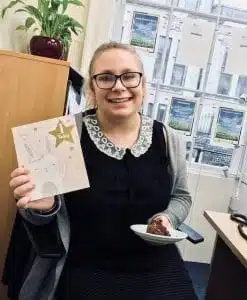We’re recruiting
We’re recruiting for a really switched on person who will hunt down and connect with the right people for us. Magda continues to try all options but she needs help. https://bit.ly/2rgC8vR
Team Building Success
After a great first quarter’s work from my team, I thought long and hard about an appropriate reward for my team. I decided on “locking them in a room to see if they could escape”…
Well done guys. The Haunted House team got out with 33 seconds to go and the Prison Break(ers) had 5 mins left.
Thank you to Trapped (Eastgate Street, Gloucester) for a fabulous experience. We’ll definitely be back to beat our times!After a great first quarter’s work from my team, I thought long and hard about an appropriate reward for my team. I decided on “locking them in a room to see if they could escape”…
Customer Experience – Putting Employees First
The topic of customer service and customer experience has been coming up in lots of client conversations as well as at networking meetings lately.
As my colleague and First Base Director David Tovey is writing a book on the subject we put our heads together to agree some thoughts and tips. Customer experience has been described as “the next competitive battleground for businesses that want to differentiate themselves” – so it’s a pretty important subject.
Firstly, there is a difference between ‘Customer Service’ and ‘Customer Experience’.
Customer service tends to be more about the interaction involving customer facing staff. Customer experience on the other hand takes into account all the interactions that a customer has with a company. There can be many different ways a customer ‘experiences’ what it is really like to buy a particular product or service. It is the sum of all those interactions that form the opinions of a customer about a supplier, whether they become loyal customers and what they tell other people.
Employees first
Both of us are clear that the companies delivering an excellent customer experience are not those who put the customer first. It is those companies that first make sure that their employee experience is excellent.
It should go without saying that if the person who works at a company is 100% proud of the Brand, is given the tools to do a good job and are treated well, they are going to be happy, Happy employees WANT to give customers a great experience.
It’s a leadership issue
All the research suggests that there is a significant difference between what senior managers in a business think the company delivers in terms of customer experience and what customers really think. If customer experience isn’t regular featured on the board’s agenda, it is likely that it isn’t on the agenda of anyone else in the business.
When everyone in an organisation is striving to deliver an excellent customer experience, the results are happy employees, happy and loyal customers and happy shareholders.
If you would like to know more about the connection between recruiting the right people, engaging them and building an even more successful business, let us know.
Sharon Adams and David Tovey
Miracle growing
Mags just popped back in – brought this with her to “Grow some candidates”
Well done Mags, always thinking of how to find the right talent for our rather fabulous clients :0) :0)
Our Lilly turns one: Happy First Base Birthday

Happy belated First Base Birthday Lilly. You’re a dream to work with!
Hospitality sector – desperate scramble to fill vacancies
The recent Manpower survey of over 2000 UK businesses reflects our own local experience that whilst jobs confidence is high, some sectors are ‘desperate’ to fill vacancies as Brexit becomes a reality.
The hospitality sector has been performing particularly well in terms of jobs (up 16% in 2017) – but there are definitely signs that some employers are in a desperate scramble to find the right people, with an increasing number citing post Brexit fears.
“Up to 24% of all hospitality staff come from the EU” – Manpower Survey
Employers fear a national shortfall of up to 750,000 people post Brexit and are pushing forward with recruitment to make up the shortfall as the number of EU workers arriving in the UK is already reported as falling.
Business rates have hit the sector hard and with the recent closure announcements by Prezzo, Byron and Jamie’s Italian, the survey highlights high levels of concern that Brexit will cut off a stream of workers from the EU that the sector is so highly dependent on.
With a potential shortage of staff looming, we are working closely with our clients in hospitality to make sure they have plans in place to avoid any negative effects on their business.
Trica Hay – MD First Base
A valuable business partner
I love working in the recruitment business. We all like positive feedback and during a recent review with the CEO of a client we have been working with since 2008, it was encouraging to be praised for providing a great service over the past 20 years.
As we shared memories of those years it made me proud to realise that the team at First Base had provided staff for over 80% of the functions within their organisation. It turned out we had provided permanent, temporary staff and maternity leave cover for functions including:
HR
Customer Service
Finance
IT
Admin
Marketing
PR
Secretarial / PA
Business Development
Sales
Security
Hospitality
Facilities Management
We worked out that First Base have recruited for 16 different departments, each with their own department head who we have got to know really well, getting to understand the way they operate their policies and culture.
Keeping in touch
Keeping in touch with our clients, whatever the size of their organisation, is key to us being able to respond effectively and swiftly. Having worked with this particular client for so long we know them and the staff that we have introduced really well.
Working together on career events, graduate recruitment and at awards events has helped us to really understand the business ad become what the CEO described as a ‘valuable business partner’.
Maintaining a good relationship and contact with temporary staff, for instance, means that when there has been an urgent requirement we can often respond immediately with individuals who have worked for our client before. This means that they fit in with the team right way and become productive from day one.
Other services
As well as keeping the client up to date with employment regulations, pay rates, industrial relations and HR issues, our relationship has meant that we have been able to help during growth times and in tougher time when sadly satellite operations had to be closed. In depth knowledge of the organisation and the individuals involved meant that we were able to put our consultants on site and help with the redundancy programme by finding jobs for those people leaving the organisation.
Let me know if we can help you with any of your recruitment challenges – I’d love to speak with you!
Tricia Hay – MD First Base.
Many roles coming in
The first quarter to date has been extremely busy. Pop in and speak to us about roles we have on including (but not limited to): Warehouse, FLT work, Engineering, Management, Sales Admin and Reception work. The number and variety of roles changes on the hour . Particularly looking to hear from people keen on long term temp/temp to perm roles.
Why didn’t I get the job?
Being rejected when you have applied for a job can be tough.
When we as recruiters act for our employer clients, it is our job to find the best candidates based on the requirements they give to us. Inevitably this will mean that some people who apply won’t be suitable to be put forward or won’t succeed at interview.
We love finding the right job for people because we know how much finding the right job can change a person’s life. A better job, increased pay, a better location or job satisfaction are just some of the life changing reasons people come to us. There can be many reasons we decide not to put a particular candidate forward or an interview is not successful – and none of them mean that those individuals should lose their enthusiasm for finding the right job.
If you treat rejection as a learning experience, speak to your recruitment consultant for advice on future applications, you can bounce back quickly from disappointment.
Three main reasons you might not receive a job offer
Your experience
No employer wants to place you in a role that you find too easy or too difficult. Either way they might end up losing you and needing to recruit again within a few weeks.
Industry and job experience has a big part to play because employers want to reduce risk. If two people apply and one has more industry or job experience the interviewer is likely to lean towards the person with most experience. Make sure you highlight transferable skills in you CV if you want to take on new roles. Spell out to your recruitment consultant and potential employer how your past experience and current skills can add value and reduce the risk of taking you on. Have you worked in a similar industry, used similar equipment, worked to similar deadlines or worked with similar software applications?
Your availability and enthusiasm
Your availability and enthusiasm to start could be the deal breaker for the manager who is recruiting, even if you are first choice. If you have a long notice period, decide you need to build that house extension or take a long holiday between jobs that might just not fit with the hiring managers need to get someone into the business when they need them.
Availability is a bigger problem if the role is temporary and the employer needs staff now. None of this is your fault of course and you may not be able to do anything about it, it’s just an issue of logistics and timing for the employer.
‘Fit’
Whenever a recruitment consultant is given a role they will always ask the employer about the organisations culture. When interviewing people for jobs the interviewer is assessing more than experience and skills. They will be considering whether you would fit with the culture of the organisation and with the other people on the team. They want to know that you will get on with the other staff in the company and they want to reduce the risk of future conflict.
Not being the right fit for one organistion just means that your personality is suited to a company where you would be more comfortable working. Both you and your employer want to know that you are working with people you can get along with.
If you didn’t get the job offer this time, make sure you get feedback from the employer and your recruitment consultant. Don’t take it personally, try to learn from the experience, change what you can and move on. Your ideal job and employer is out there!
Tricia Hay
MD First Base Employment
Another brilliant result – relationships matter!
I recently wrote about the importance of building a good relationship with your recruitment consultant when seeking a new role or career. Here’s another example of how well it works for candidates who are proactive and willing to learn!
The candidate who wrote the testimonial below didn’t just send off her CV, as soon as she had done some research into First Base she came along to our offices to seek career advice on how to improve her chances of getting the type of job she was hoping for. By taking responsibility to build a relationship early she was able to help a member our talent resourcing team to get to know her and find the right type of opportunity. The kind comments made after receiving a job offer proves the point!
“Having just finished a contract, I dutifully sent my CV off to a few agencies for work having perused their websites and what vacancies they represented. A good gut feeling made me call First Base, not just for work but for some career guidance and advice. From the first point of contact with the member of staff who answered the phone they positively directed me to the right person I needed to talk to … a Talent Resourcer; Flo Bond. The next working day I was in for an interview and within a few days out to a major client of theirs for an interview as Flo had the foresight of seeing me fit in well within the organisation. I proudly have a job offer with this company which I have accepted.
There are a lot of Employment Agencies presented on social media but nothing replaces the chance of a face to face meeting with a professional. I absolutely recommend First Base Employment.”
Don’t just send off your CV with fingers crossed – be proactive, speak to your recruitment consultant, demonstrate your enthusiasm to learn and you too could soon be finding the job you are looking for!
Be proactive – Contact First Base today on 01453 755330!
Tricia Hay – MD First Base Employment



